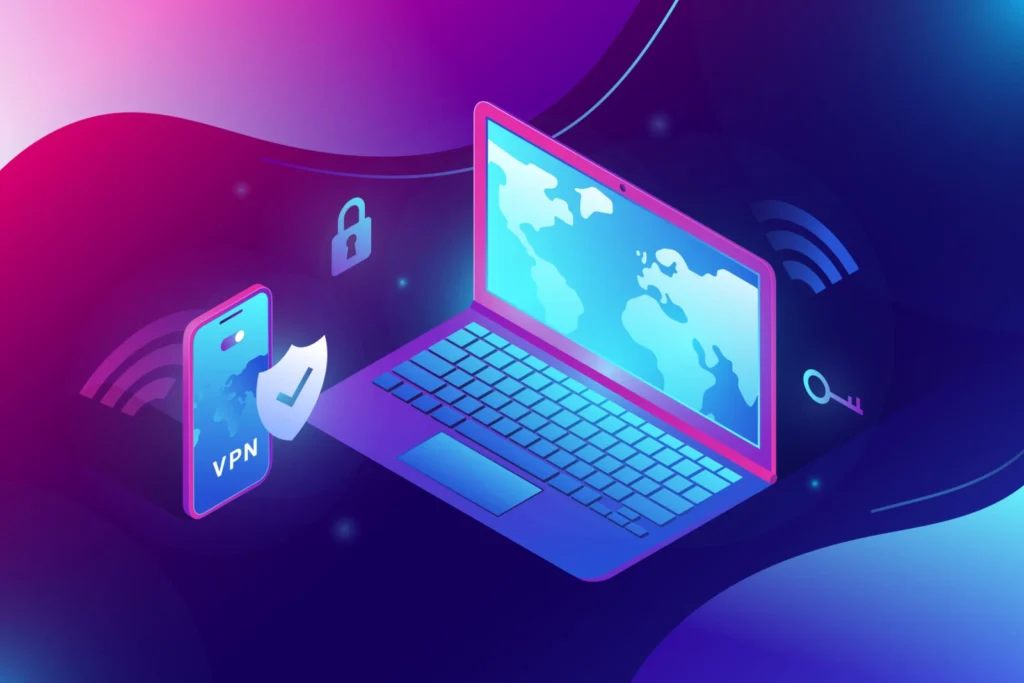When it comes to your online security, it’s important to be proactive. With the increasing number of cyber threats, protecting your personal data and privacy is crucial.
One effective way to enhance your online security is by using a VPN, or Virtual Private Network. But where do you start? By understanding the basics of VPNs and choosing the right provider, you can significantly strengthen your digital defenses.
However, that’s just the beginning.
Understanding VPNs
A Virtual Private Network (VPN) works by creating a secure, encrypted connection between your device and the internet. When you connect to a VPN, all of your internet traffic is directed through this encrypted tunnel. Resultantly, it protects you from unauthorized access and potential cyber threats. This means that your online activities, such as browsing, messaging, or streaming, are kept private and secure, preventing any unwanted surveillance or hacking attempts.
By using a VPN, you can browse the internet without worrying about your sensitive information falling into the wrong hands. The VPN masks your real IP address, making it difficult for anyone to track your online movements. This not only safeguards your privacy but also allows you to access content that may be restricted based on your location and bypass any censorship. It ensures that you have unrestricted access to information and entertainment.
In essence, understanding how VPNs work empowers you to take control of your online security and privacy. It gives you the freedom to explore the digital world without compromising your personal data or risking cyber threats. You can download an online VPN for free in your browser.
Choosing the Right VPN Provider
When choosing a VPN provider, it’s important to carefully consider their reputation and track record. Since online security and privacy are paramount, the selection of the right VPN provider is crucial for your digital freedom.
Here are some key factors to keep in mind when evaluating VPN providers:
- Privacy Policy: Look for a provider that has a strict no-logs policy to ensure that your online activities remain private and secure.
- Security Features: Give priority to providers that offer strong encryption protocols, such as AES-256, and additional security features like a kill switch and DNS leak protection.
- Server Network: A wide range of server locations and a large number of servers can give you more options for accessing geo-restricted content and improving connection speeds.
- Customer Support: Opt for a VPN provider that has responsive and knowledgeable customer support to address any issues or concerns promptly, ensuring a smooth and hassle-free experience.
Utilizing VPN for Public Wi-Fi
When using public Wi-Fi, it’s important to prioritize the security and privacy features offered by a reputable VPN provider. Cybercriminals often target public Wi-Fi networks in order to intercept users’ data. By using a VPN, you can establish a secure and encrypted connection to the internet, safeguarding your online activities from prying eyes.
With a VPN, you can confidently browse the web, check emails, and access your favorite online services without worrying about the potential security risks associated with public Wi-Fi hotspots.
In addition to providing security, a VPN also allows you to bypass any restrictions or censorship imposed on public Wi-Fi networks, giving you the freedom to access the content you desire. Whether you’re traveling, working remotely, or simply enjoying a cup of coffee at a local cafe, a VPN ensures that your online activities remain private and secure.
Furthermore, using a VPN for public Wi-Fi can prevent advertisers and other third parties from tracking your online behavior, giving you greater control over your digital footprint. By utilizing a VPN, you can enjoy the convenience of public Wi-Fi without compromising your online privacy and security.
Securing Multiple Devices With VPN
Securing multiple devices with a VPN is a simple and effective way to protect your gadgets. Whether you need to secure your smartphone, tablet, laptop, or even your smart home devices, a VPN can provide a secure connection for all of them.
Here are some tips to make the most out of securing multiple devices with a VPN:
- Choose a VPN that’s compatible with different operating systems such as Windows, macOS, iOS, Android, and routers. This way, you can ensure that all your devices are covered.
- Look for a VPN service that allows multiple simultaneous connections. This will allow you to secure all your devices without any limitations.
- Opt for a VPN that offers a centralized management dashboard. This makes it easy to monitor and control the security of all your connected devices from one place.
- Select a VPN that allows custom configuration. This will enable you to fine-tune security settings for different devices based on their specific needs.
Best Practices for VPN Usage
To get the most out of your VPN and keep your internet browsing secure, it’s important to follow these best practices:
- Keep your VPN software up to date: Regularly update your VPN client software to ensure that you have the latest security patches and features.
- Use strong passwords: Set a strong, unique password for your VPN account to prevent unauthorized access. Avoid using common passwords or easily guessable combinations.
- Enable the kill switch feature: Activate the kill switch feature on your VPN. This will automatically disconnect your internet connection if the VPN connection drops, preventing your data from being exposed.
- Choose secure protocols: Select VPN protocols like OpenVPN or IKEv2, which are known for their strong security measures. These protocols provide enhanced encryption and authentication, making your connection more secure.
Conclusion
Now that you’ve learned how to enhance your online security with VPNs, you can browse the web with confidence and peace of mind.
By selecting the right VPN provider, using VPNs for public Wi-Fi connections, and securing multiple devices, you’re taking proactive steps to safeguard your personal information and data.
Keep following these best practices for VPN usage, and you’ll never have to worry about online security again.
Stay safe out there!







